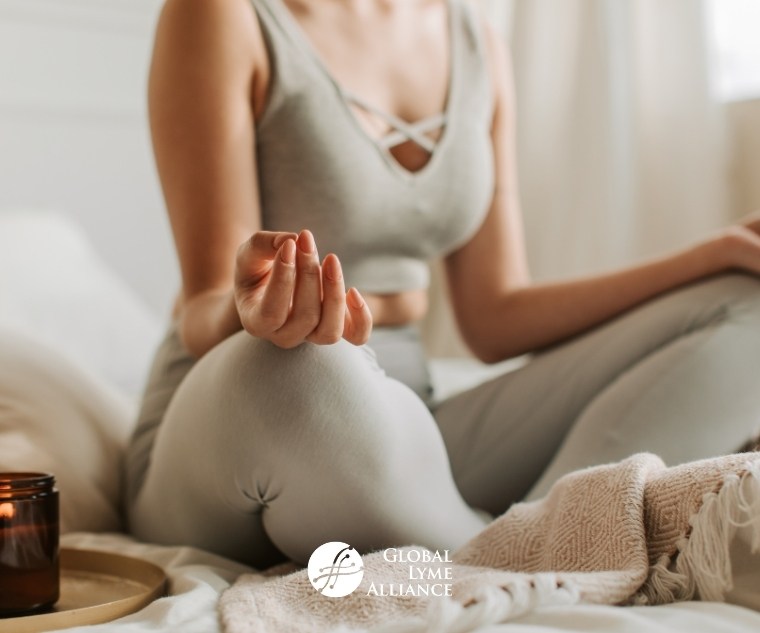
Learn about the positive effects of meditation from an Integrative Nutrition & Holistic Health Coach and Registered Yoga Instructor.
We’ve all heard the benefits of meditation, which continues to be backed by science with ever-evolving research for both physical and mental health reasons. I’ll say it until I die: meditation helps in healing everything. You might be rolling your eyes at this, but it’s true. I was once a skeptic myself, but once I opened up, I swear that it changed the entire game.
-1.png?width=253&height=230&name=download%20(9)-1.png) Science is now proving that a simple daily meditation practice can have profound effects on the physiology of the human body, and can even provide healing from the most chronic of all health issues. Under trauma, depression, chronic stress, or anxiety - which are all present for many with chronic illness - the amygdala is heightened, which is the emotional side of the brain that creates the “fight or flight” response in the body. When the emotional brain is over-stimulated, it begins to override the frontal cortex, or the rational part of the brain. Studies have proven that meditation strengthens the frontal cortex and reduces the amygdala, which teaches the rational brain to better regulate mood and emotional states, even in the most stressful of situations. So just by sitting in stillness, becoming more aware of the present moment, and focusing on the breath, you can literally rewire the neural pathways in your brain.
Science is now proving that a simple daily meditation practice can have profound effects on the physiology of the human body, and can even provide healing from the most chronic of all health issues. Under trauma, depression, chronic stress, or anxiety - which are all present for many with chronic illness - the amygdala is heightened, which is the emotional side of the brain that creates the “fight or flight” response in the body. When the emotional brain is over-stimulated, it begins to override the frontal cortex, or the rational part of the brain. Studies have proven that meditation strengthens the frontal cortex and reduces the amygdala, which teaches the rational brain to better regulate mood and emotional states, even in the most stressful of situations. So just by sitting in stillness, becoming more aware of the present moment, and focusing on the breath, you can literally rewire the neural pathways in your brain.
The Benefits of meditation
- Eases depression, stress, and anxiety
- Boosts energy
- Improves mood and cognitive function
- Lowers inflammation
- Promotes a more restful sleep
- Increases pain threshold
- Lowers blood pressure
- Relaxes the mind and body
When it comes to chronic illness specifically, studies have also shown the effectiveness of meditation in reducing chronic pain. In meditation, a different pathway in the brain is activated, which is the same pathway in the body that is activated with the use of painkillers. When it comes to my own journey with chronic Lyme, here are a few other benefits that I’ve found through my meditation practice:
- Helps you reconnect to your body: From my own experience with Lyme, I know how easy it is to totally disconnect from your body. Sometimes it feels like your body betrayed you for getting so sick or not being able to get better fast enough. Meditation allows you to find so much peace with your body, to realize that it’s doing its best every single day and is literally fighting so hard to keep you safe. The body is so incredibly smart, and symptoms are its way of communicating that something isn’t right. And once you begin to recognize that, you’ll begin to feel so much more compassion for your body.
- Activates the parasympathetic nervous system: Nervous system regulation is so incredibly key for managing any health concern, let alone a chronic illness. When we activate the parasympathetic nervous system, we turn on the body’s relaxation response, which then turns off the body’s stress response. And less stress = less inflammation = endless health benefits.
- Brings your focus to the present instead of focusing on the past or worrying about the future: We can’t change the past, and we clearly can’t control the future, so there’s no reason to spend our time ruminating about either. It’s easy to think about the “good days” from before we got sick, but we can’t do anything to change that. Lyme is so unpredictable, so there’s no need to worry about the future either when we could very well feel great tomorrow. The best place to be is right here in the present, which is exactly where meditation takes us.
- Allows you to trust in a greater purpose or power that goes beyond your illness: For me, this one is huge. Meditation has allowed me to find so much peace and trust in my healing. This doesn’t mean you’ll never have a bad day again, and if that’s something you can figure out then please let the rest of us know. Instead, when days are really tough, meditation allows you to truly trust that it will get better. Call me naive, but I know that I won’t live like this forever. Everything happens for a reason, but sometimes it just takes extra trust to believe in that.
- Reminds you of your strength: There’s just something about sitting in stillness with nothing but your own thoughts that makes you realize how strong and resilient you are. Think of everything you’ve been through to get where you are today, and then throw a debilitating illness on top of that - that takes an incredible amount of strength to get through. No matter what life throws your way, trust that you have the strength to make it through. Because you always have, and you always will.
"I think that the main reasons why people are so reluctant to start their own meditation practice are because they either claim to not have time or find it too overwhelming to get into."
-1.png?width=226&height=264&name=download%20(12)-1.png) I think that the main reasons why people are so reluctant to start their own meditation practice are because they either claim to not have time or find it too overwhelming to get into. Which makes sense, the idea of sitting in stillness with nothing but your own thoughts can be daunting, but in my opinion, that isn’t what meditation is really about. The easiest way that I can explain meditation is that it’s simply increasing awareness. It’s being mindful of the here and now. It’s noticing all of the little things. It’s using your senses to bring you back into the present moment. Meditation is not stopping your thoughts, that literally isn’t possible. Instead it’s noticing those thoughts, acknowledging them, and then coming back to the present moment. Sometimes it’s easier to focus on one single thing while meditating, such as your breath, and using that as an anchor to come back to when your mind inevitably starts to wander.
I think that the main reasons why people are so reluctant to start their own meditation practice are because they either claim to not have time or find it too overwhelming to get into. Which makes sense, the idea of sitting in stillness with nothing but your own thoughts can be daunting, but in my opinion, that isn’t what meditation is really about. The easiest way that I can explain meditation is that it’s simply increasing awareness. It’s being mindful of the here and now. It’s noticing all of the little things. It’s using your senses to bring you back into the present moment. Meditation is not stopping your thoughts, that literally isn’t possible. Instead it’s noticing those thoughts, acknowledging them, and then coming back to the present moment. Sometimes it’s easier to focus on one single thing while meditating, such as your breath, and using that as an anchor to come back to when your mind inevitably starts to wander.
The last thing I’ll say is that if you’ve tried meditation before and haven’t found it helpful, I really encourage you to try again. There are so many different methods and forms of meditation, so keep trying until you find the one that works for you. Start small, maybe even just one minute everyday, because I also know how daily tasks can sometimes feel so overwhelming.
If you’re looking for inspiration, consider some of these methods:
- Affirmations: Use “I am” statements to affirm your healing. Every single day I say to myself “I am strong. I am healthy. I am healing”, usually multiple times per day. I won’t get too into this, but affirmations are also shown to help physically rewire the subconscious part of the brain to allow for healing. There is such a power in belief, so start telling yourself that you’re healthy.
- Body scan: Close your eyes and shift your attention to different parts of your body, noticing how they feel and sending the parts that are in pain a little extra love. Be grateful for your body for all that it does to keep you safe, and for fighting so hard against such an insidious disease.
- Gratitude: Think of a few things you’re grateful for, literally anything. If you think there’s nothing to be grateful for, think harder. There is ALWAYS something, and soon you’ll notice that you actually start to look for these things in your daily life.
- Breathwork: There are so many different breathing techniques to try, which are actually incredibly beneficial on a physiological level. Deep, conscious breathing calms the nervous system, lowers inflammation, and releases feel-good hormones in the body. You can try something as simple as 4-7-8 breathing (inhale for 4, hold for 7, exhale for 8) or something more complex like Wim-Hof. Google different techniques and follow guided videos to help get you started.
Even just a few minutes of stillness and introspection offers the most incredible relief, more than any pill I’ve ever taken. And just like with all things in life, meditation gets easier with time and practice. The more you begin to add simple “meditative moments” into your day, the more you’ll start to notice those little subtleties that we so often overlook, making life so much more beautiful.
The above material is provided for information purposes only. The material (a) is not nor should be considered, or used as a substitute for, medical advice, diagnosis, or treatment, nor (b) does it necessarily represent endorsement by or an official position of Global Lyme Alliance, Inc. or any of its directors, officers, advisors or volunteers. Advice on the testing, treatment or care of an individual patient should be obtained through consultation with a physician who has examined that patient or is familiar with that patient’s medical history.

Grayce Muffler
GLA Contributor
*Opinions expressed by contributors are their own. As an Integrative Nutrition & Holistic Health Coach and Registered Yoga Instructor, I hold space for my clients suffering from Lyme and other complex chronic illness and teach them how to become their own self healers. If you are interested in learning more, I would love to schedule a free consultation call and understand how I can best serve you. @givinggrayce
Email: graycemuffler@gmail.com